Health and Social Care Psychology: Life Span Development Assignment
VerifiedAdded on 2020/01/07
|17
|5591
|333
Homework Assignment
AI Summary
This psychology assignment delves into various aspects of human behavior within the context of health and social care. It begins by comparing different theories of life span development, including continuity versus discontinuity and stage versus open-ended theories, and how these theories relate to different life stages. The assignment then explores social and biological factors influencing human behavior, emphasizing the importance of social roles in health and social care settings. Furthermore, it analyzes the application of psychological theories to individuals experiencing stress and behavior disturbances. The assignment also examines the practical application of psychological principles in promoting behavior change within health and social care environments. The document covers topics such as behavioral, cognitive, psychodynamic, and humanistic theories and their impact on individuals across the lifespan. This document is provided by a student to help others understand psychology concepts.
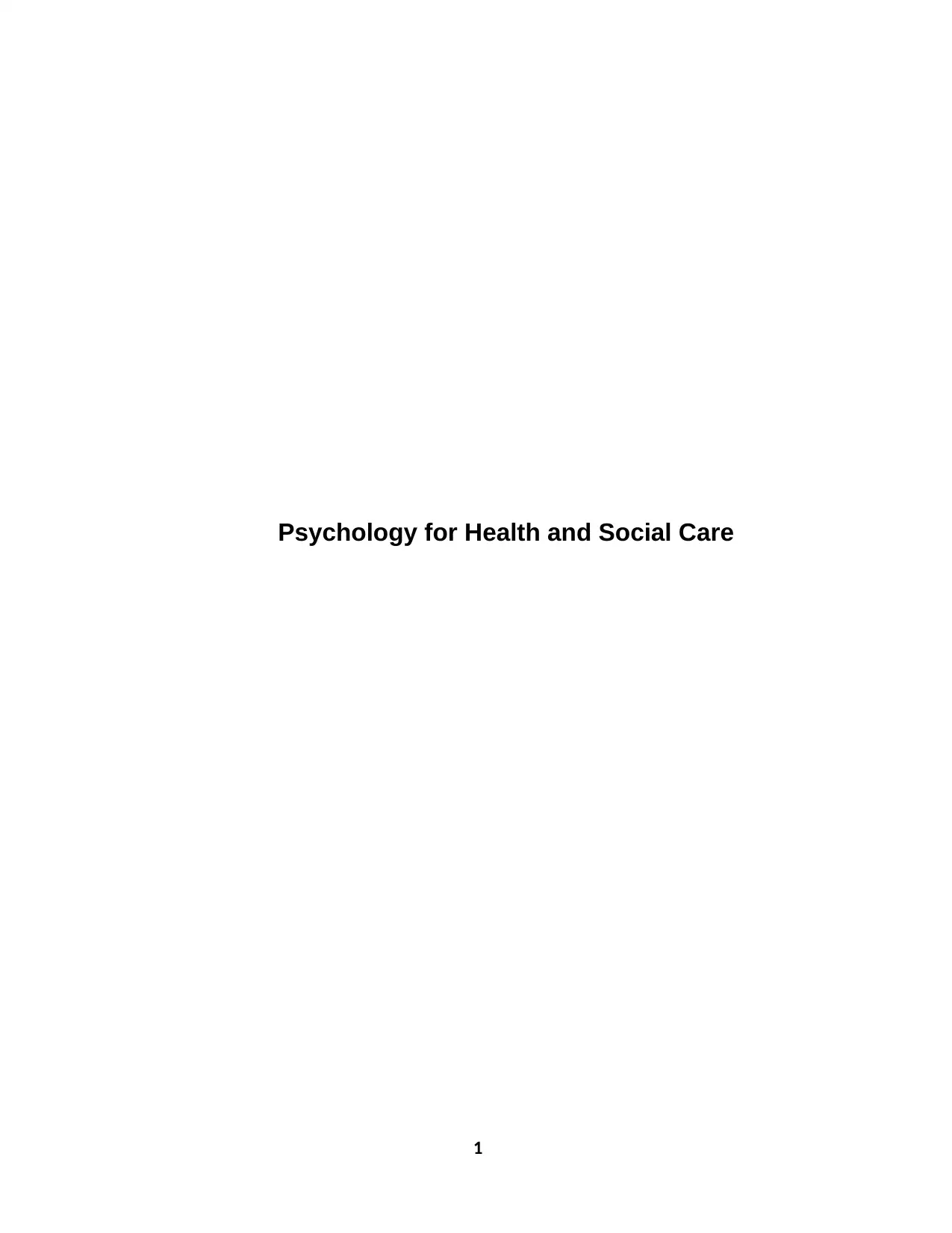
Psychology for Health and Social Care
1
1
Paraphrase This Document
Need a fresh take? Get an instant paraphrase of this document with our AI Paraphraser
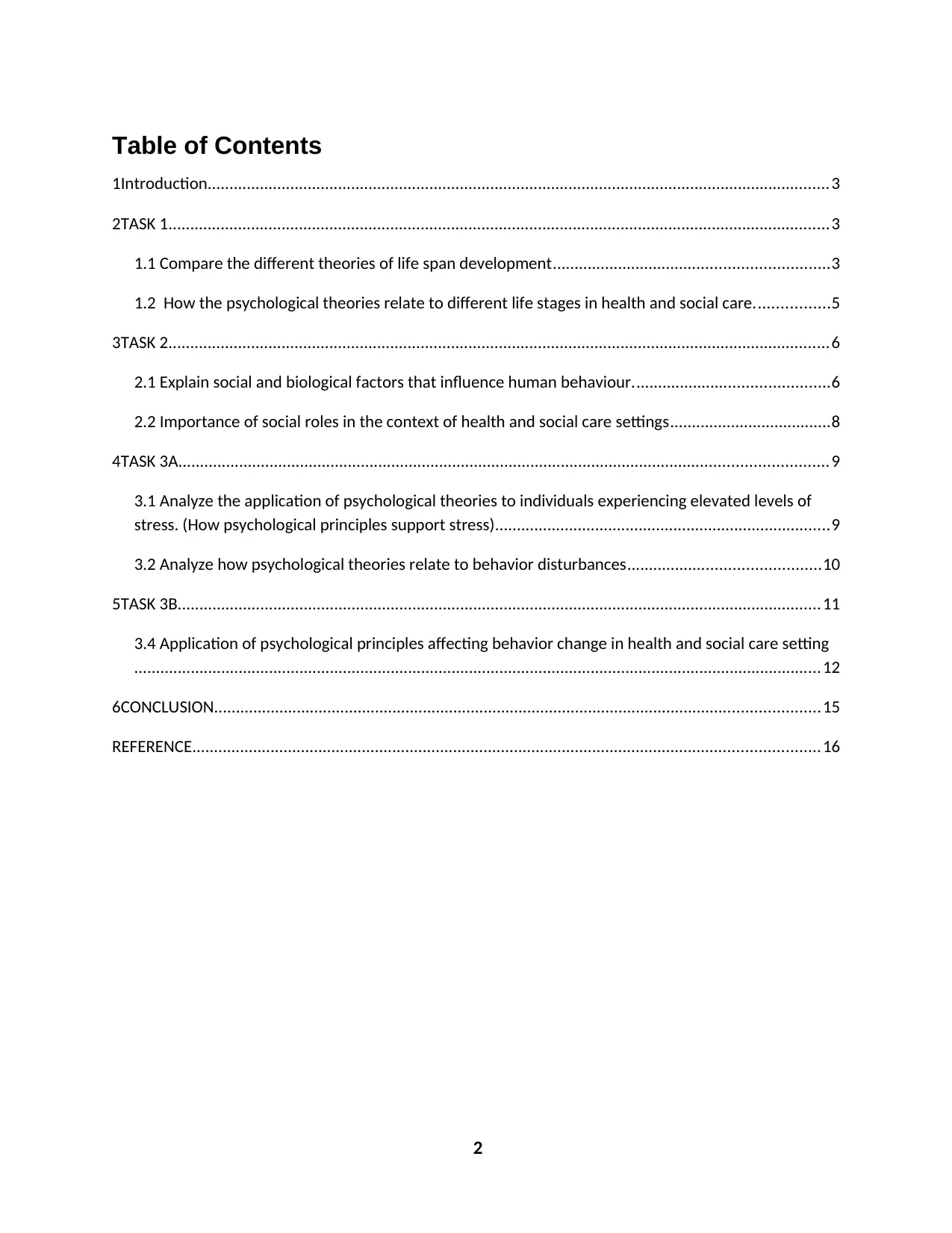
Table of Contents
1Introduction...............................................................................................................................................3
2TASK 1........................................................................................................................................................3
1.1 Compare the different theories of life span development...............................................................3
1.2 How the psychological theories relate to different life stages in health and social care.................5
3TASK 2........................................................................................................................................................6
2.1 Explain social and biological factors that influence human behaviour.............................................6
2.2 Importance of social roles in the context of health and social care settings.....................................8
4TASK 3A.....................................................................................................................................................9
3.1 Analyze the application of psychological theories to individuals experiencing elevated levels of
stress. (How psychological principles support stress).............................................................................9
3.2 Analyze how psychological theories relate to behavior disturbances............................................10
5TASK 3B....................................................................................................................................................11
3.4 Application of psychological principles affecting behavior change in health and social care setting
..............................................................................................................................................................12
6CONCLUSION...........................................................................................................................................15
REFERENCE................................................................................................................................................16
2
1Introduction...............................................................................................................................................3
2TASK 1........................................................................................................................................................3
1.1 Compare the different theories of life span development...............................................................3
1.2 How the psychological theories relate to different life stages in health and social care.................5
3TASK 2........................................................................................................................................................6
2.1 Explain social and biological factors that influence human behaviour.............................................6
2.2 Importance of social roles in the context of health and social care settings.....................................8
4TASK 3A.....................................................................................................................................................9
3.1 Analyze the application of psychological theories to individuals experiencing elevated levels of
stress. (How psychological principles support stress).............................................................................9
3.2 Analyze how psychological theories relate to behavior disturbances............................................10
5TASK 3B....................................................................................................................................................11
3.4 Application of psychological principles affecting behavior change in health and social care setting
..............................................................................................................................................................12
6CONCLUSION...........................................................................................................................................15
REFERENCE................................................................................................................................................16
2
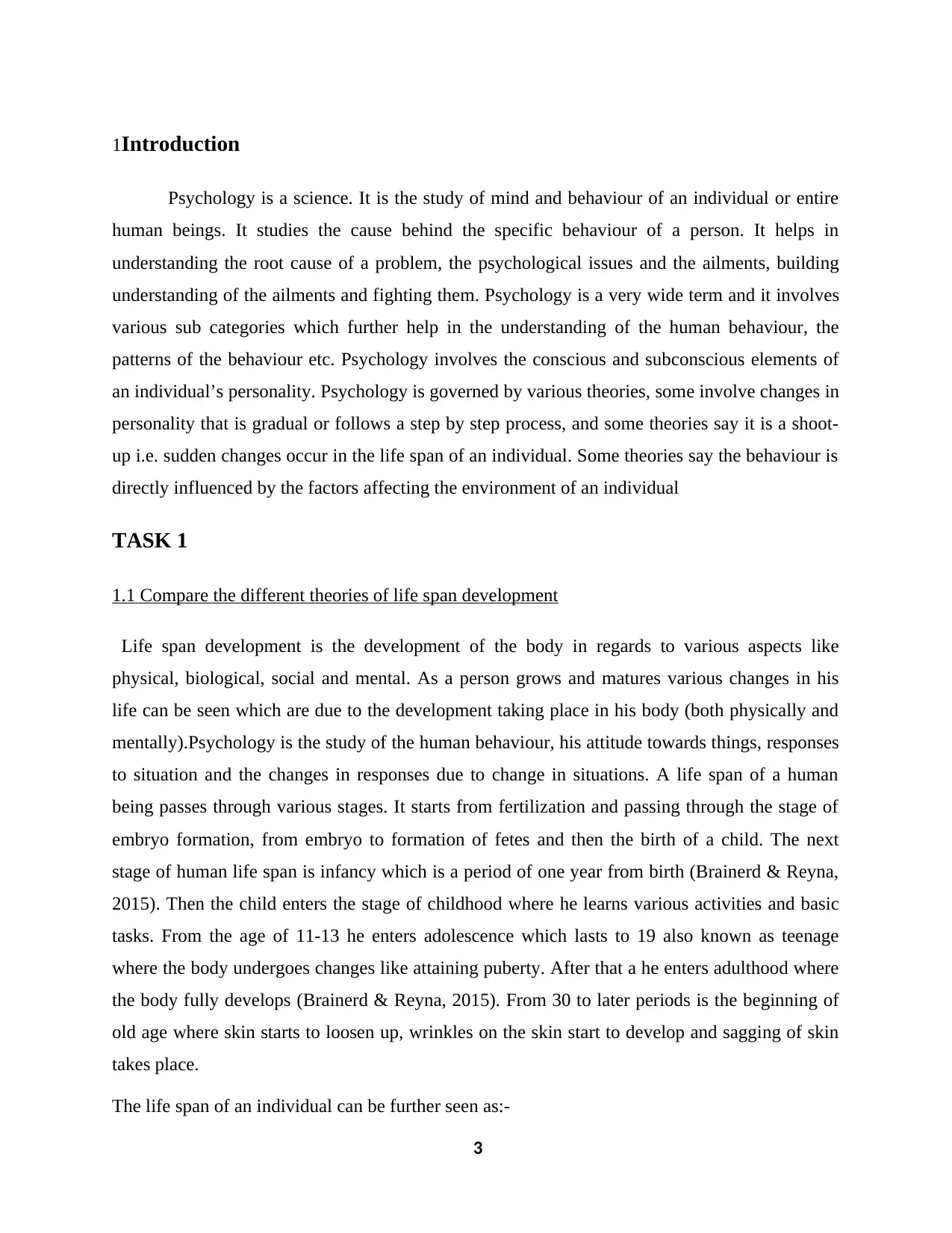
1Introduction
Psychology is a science. It is the study of mind and behaviour of an individual or entire
human beings. It studies the cause behind the specific behaviour of a person. It helps in
understanding the root cause of a problem, the psychological issues and the ailments, building
understanding of the ailments and fighting them. Psychology is a very wide term and it involves
various sub categories which further help in the understanding of the human behaviour, the
patterns of the behaviour etc. Psychology involves the conscious and subconscious elements of
an individual’s personality. Psychology is governed by various theories, some involve changes in
personality that is gradual or follows a step by step process, and some theories say it is a shoot-
up i.e. sudden changes occur in the life span of an individual. Some theories say the behaviour is
directly influenced by the factors affecting the environment of an individual
TASK 1
1.1 Compare the different theories of life span development
Life span development is the development of the body in regards to various aspects like
physical, biological, social and mental. As a person grows and matures various changes in his
life can be seen which are due to the development taking place in his body (both physically and
mentally).Psychology is the study of the human behaviour, his attitude towards things, responses
to situation and the changes in responses due to change in situations. A life span of a human
being passes through various stages. It starts from fertilization and passing through the stage of
embryo formation, from embryo to formation of fetes and then the birth of a child. The next
stage of human life span is infancy which is a period of one year from birth (Brainerd & Reyna,
2015). Then the child enters the stage of childhood where he learns various activities and basic
tasks. From the age of 11-13 he enters adolescence which lasts to 19 also known as teenage
where the body undergoes changes like attaining puberty. After that a he enters adulthood where
the body fully develops (Brainerd & Reyna, 2015). From 30 to later periods is the beginning of
old age where skin starts to loosen up, wrinkles on the skin start to develop and sagging of skin
takes place.
The life span of an individual can be further seen as:-
3
Psychology is a science. It is the study of mind and behaviour of an individual or entire
human beings. It studies the cause behind the specific behaviour of a person. It helps in
understanding the root cause of a problem, the psychological issues and the ailments, building
understanding of the ailments and fighting them. Psychology is a very wide term and it involves
various sub categories which further help in the understanding of the human behaviour, the
patterns of the behaviour etc. Psychology involves the conscious and subconscious elements of
an individual’s personality. Psychology is governed by various theories, some involve changes in
personality that is gradual or follows a step by step process, and some theories say it is a shoot-
up i.e. sudden changes occur in the life span of an individual. Some theories say the behaviour is
directly influenced by the factors affecting the environment of an individual
TASK 1
1.1 Compare the different theories of life span development
Life span development is the development of the body in regards to various aspects like
physical, biological, social and mental. As a person grows and matures various changes in his
life can be seen which are due to the development taking place in his body (both physically and
mentally).Psychology is the study of the human behaviour, his attitude towards things, responses
to situation and the changes in responses due to change in situations. A life span of a human
being passes through various stages. It starts from fertilization and passing through the stage of
embryo formation, from embryo to formation of fetes and then the birth of a child. The next
stage of human life span is infancy which is a period of one year from birth (Brainerd & Reyna,
2015). Then the child enters the stage of childhood where he learns various activities and basic
tasks. From the age of 11-13 he enters adolescence which lasts to 19 also known as teenage
where the body undergoes changes like attaining puberty. After that a he enters adulthood where
the body fully develops (Brainerd & Reyna, 2015). From 30 to later periods is the beginning of
old age where skin starts to loosen up, wrinkles on the skin start to develop and sagging of skin
takes place.
The life span of an individual can be further seen as:-
3
⊘ This is a preview!⊘
Do you want full access?
Subscribe today to unlock all pages.

Trusted by 1+ million students worldwide
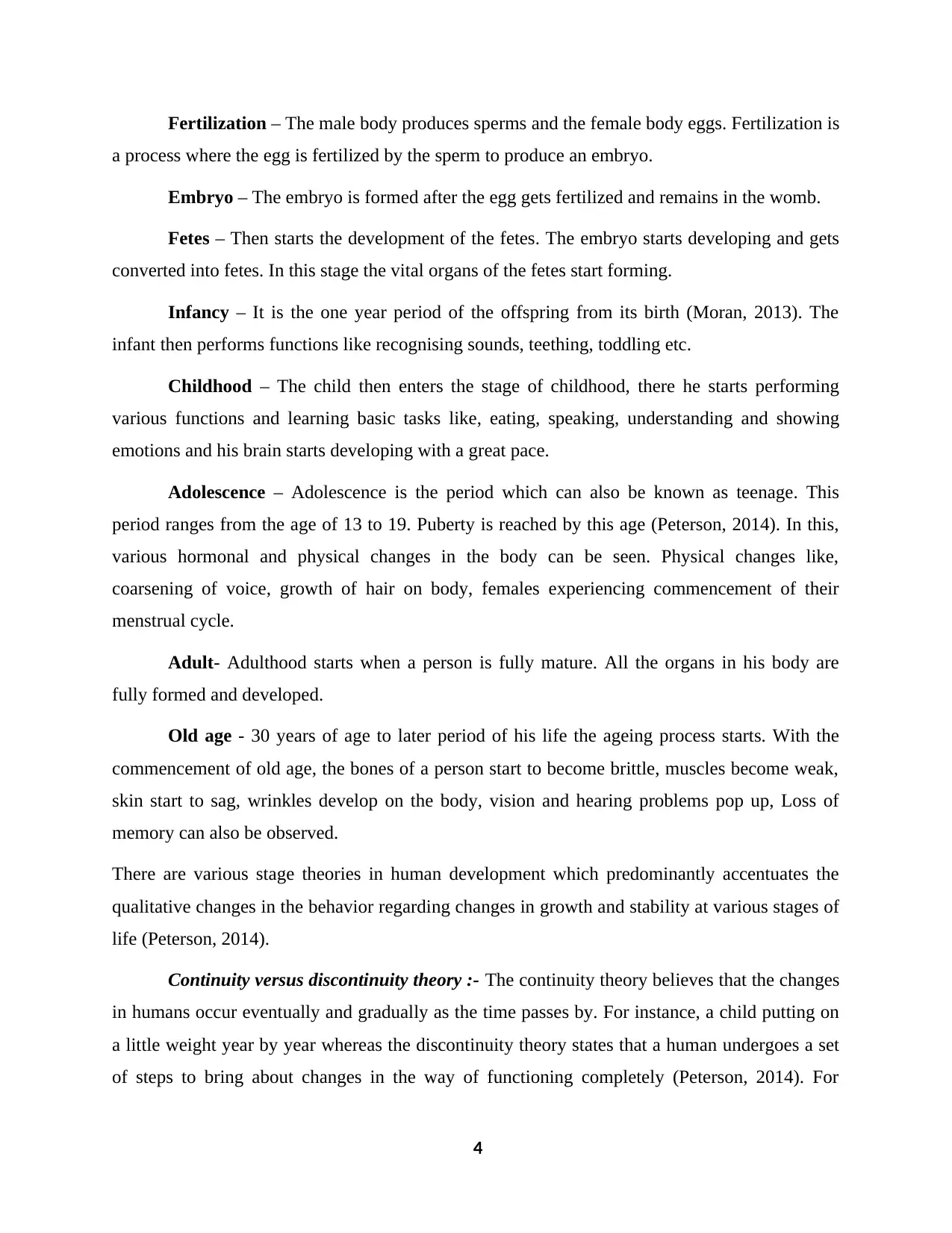
Fertilization – The male body produces sperms and the female body eggs. Fertilization is
a process where the egg is fertilized by the sperm to produce an embryo.
Embryo – The embryo is formed after the egg gets fertilized and remains in the womb.
Fetes – Then starts the development of the fetes. The embryo starts developing and gets
converted into fetes. In this stage the vital organs of the fetes start forming.
Infancy – It is the one year period of the offspring from its birth (Moran, 2013). The
infant then performs functions like recognising sounds, teething, toddling etc.
Childhood – The child then enters the stage of childhood, there he starts performing
various functions and learning basic tasks like, eating, speaking, understanding and showing
emotions and his brain starts developing with a great pace.
Adolescence – Adolescence is the period which can also be known as teenage. This
period ranges from the age of 13 to 19. Puberty is reached by this age (Peterson, 2014). In this,
various hormonal and physical changes in the body can be seen. Physical changes like,
coarsening of voice, growth of hair on body, females experiencing commencement of their
menstrual cycle.
Adult- Adulthood starts when a person is fully mature. All the organs in his body are
fully formed and developed.
Old age - 30 years of age to later period of his life the ageing process starts. With the
commencement of old age, the bones of a person start to become brittle, muscles become weak,
skin start to sag, wrinkles develop on the body, vision and hearing problems pop up, Loss of
memory can also be observed.
There are various stage theories in human development which predominantly accentuates the
qualitative changes in the behavior regarding changes in growth and stability at various stages of
life (Peterson, 2014).
Continuity versus discontinuity theory :- The continuity theory believes that the changes
in humans occur eventually and gradually as the time passes by. For instance, a child putting on
a little weight year by year whereas the discontinuity theory states that a human undergoes a set
of steps to bring about changes in the way of functioning completely (Peterson, 2014). For
4
a process where the egg is fertilized by the sperm to produce an embryo.
Embryo – The embryo is formed after the egg gets fertilized and remains in the womb.
Fetes – Then starts the development of the fetes. The embryo starts developing and gets
converted into fetes. In this stage the vital organs of the fetes start forming.
Infancy – It is the one year period of the offspring from its birth (Moran, 2013). The
infant then performs functions like recognising sounds, teething, toddling etc.
Childhood – The child then enters the stage of childhood, there he starts performing
various functions and learning basic tasks like, eating, speaking, understanding and showing
emotions and his brain starts developing with a great pace.
Adolescence – Adolescence is the period which can also be known as teenage. This
period ranges from the age of 13 to 19. Puberty is reached by this age (Peterson, 2014). In this,
various hormonal and physical changes in the body can be seen. Physical changes like,
coarsening of voice, growth of hair on body, females experiencing commencement of their
menstrual cycle.
Adult- Adulthood starts when a person is fully mature. All the organs in his body are
fully formed and developed.
Old age - 30 years of age to later period of his life the ageing process starts. With the
commencement of old age, the bones of a person start to become brittle, muscles become weak,
skin start to sag, wrinkles develop on the body, vision and hearing problems pop up, Loss of
memory can also be observed.
There are various stage theories in human development which predominantly accentuates the
qualitative changes in the behavior regarding changes in growth and stability at various stages of
life (Peterson, 2014).
Continuity versus discontinuity theory :- The continuity theory believes that the changes
in humans occur eventually and gradually as the time passes by. For instance, a child putting on
a little weight year by year whereas the discontinuity theory states that a human undergoes a set
of steps to bring about changes in the way of functioning completely (Peterson, 2014). For
4
Paraphrase This Document
Need a fresh take? Get an instant paraphrase of this document with our AI Paraphraser
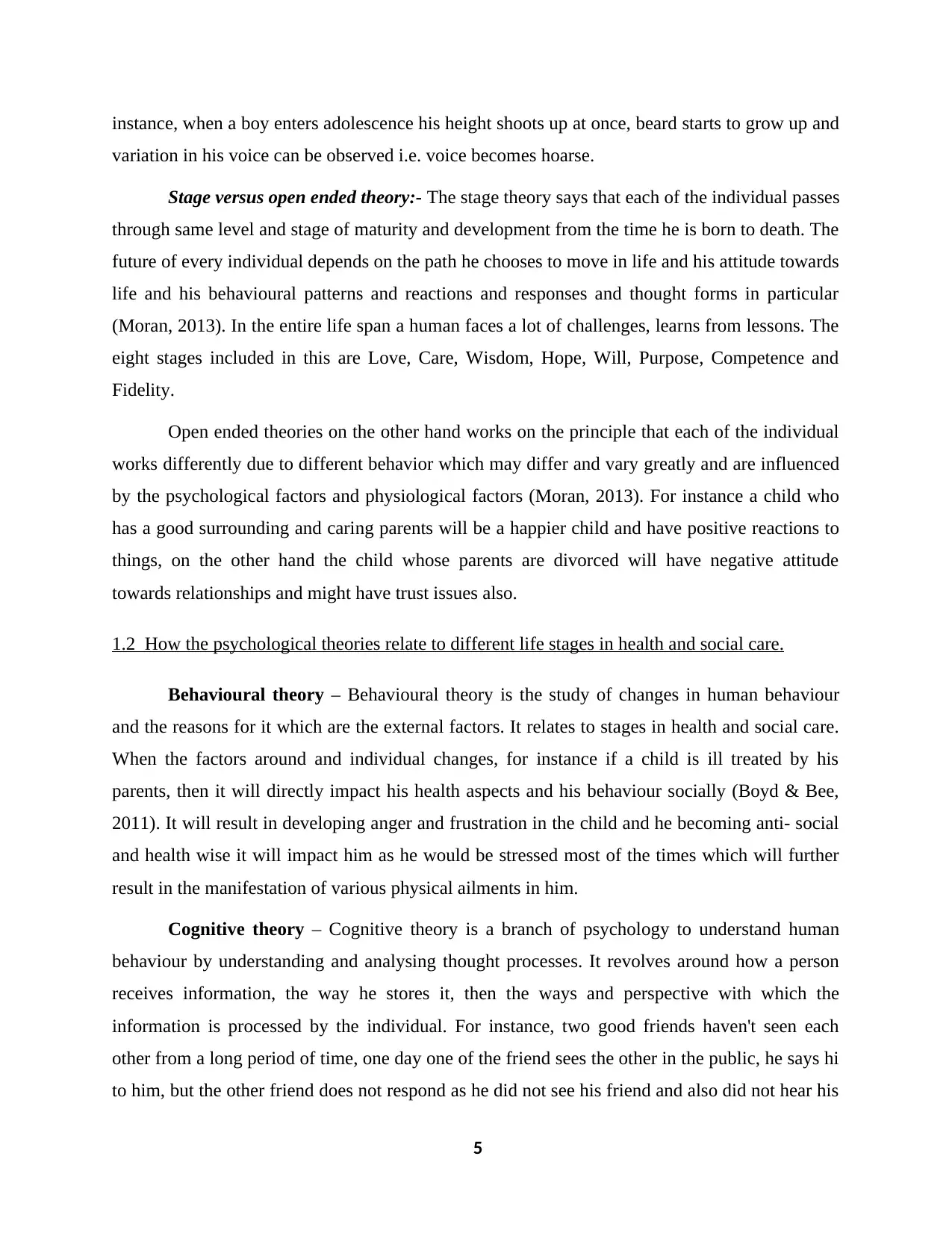
instance, when a boy enters adolescence his height shoots up at once, beard starts to grow up and
variation in his voice can be observed i.e. voice becomes hoarse.
Stage versus open ended theory:- The stage theory says that each of the individual passes
through same level and stage of maturity and development from the time he is born to death. The
future of every individual depends on the path he chooses to move in life and his attitude towards
life and his behavioural patterns and reactions and responses and thought forms in particular
(Moran, 2013). In the entire life span a human faces a lot of challenges, learns from lessons. The
eight stages included in this are Love, Care, Wisdom, Hope, Will, Purpose, Competence and
Fidelity.
Open ended theories on the other hand works on the principle that each of the individual
works differently due to different behavior which may differ and vary greatly and are influenced
by the psychological factors and physiological factors (Moran, 2013). For instance a child who
has a good surrounding and caring parents will be a happier child and have positive reactions to
things, on the other hand the child whose parents are divorced will have negative attitude
towards relationships and might have trust issues also.
1.2 How the psychological theories relate to different life stages in health and social care.
Behavioural theory – Behavioural theory is the study of changes in human behaviour
and the reasons for it which are the external factors. It relates to stages in health and social care.
When the factors around and individual changes, for instance if a child is ill treated by his
parents, then it will directly impact his health aspects and his behaviour socially (Boyd & Bee,
2011). It will result in developing anger and frustration in the child and he becoming anti- social
and health wise it will impact him as he would be stressed most of the times which will further
result in the manifestation of various physical ailments in him.
Cognitive theory – Cognitive theory is a branch of psychology to understand human
behaviour by understanding and analysing thought processes. It revolves around how a person
receives information, the way he stores it, then the ways and perspective with which the
information is processed by the individual. For instance, two good friends haven't seen each
other from a long period of time, one day one of the friend sees the other in the public, he says hi
to him, but the other friend does not respond as he did not see his friend and also did not hear his
5
variation in his voice can be observed i.e. voice becomes hoarse.
Stage versus open ended theory:- The stage theory says that each of the individual passes
through same level and stage of maturity and development from the time he is born to death. The
future of every individual depends on the path he chooses to move in life and his attitude towards
life and his behavioural patterns and reactions and responses and thought forms in particular
(Moran, 2013). In the entire life span a human faces a lot of challenges, learns from lessons. The
eight stages included in this are Love, Care, Wisdom, Hope, Will, Purpose, Competence and
Fidelity.
Open ended theories on the other hand works on the principle that each of the individual
works differently due to different behavior which may differ and vary greatly and are influenced
by the psychological factors and physiological factors (Moran, 2013). For instance a child who
has a good surrounding and caring parents will be a happier child and have positive reactions to
things, on the other hand the child whose parents are divorced will have negative attitude
towards relationships and might have trust issues also.
1.2 How the psychological theories relate to different life stages in health and social care.
Behavioural theory – Behavioural theory is the study of changes in human behaviour
and the reasons for it which are the external factors. It relates to stages in health and social care.
When the factors around and individual changes, for instance if a child is ill treated by his
parents, then it will directly impact his health aspects and his behaviour socially (Boyd & Bee,
2011). It will result in developing anger and frustration in the child and he becoming anti- social
and health wise it will impact him as he would be stressed most of the times which will further
result in the manifestation of various physical ailments in him.
Cognitive theory – Cognitive theory is a branch of psychology to understand human
behaviour by understanding and analysing thought processes. It revolves around how a person
receives information, the way he stores it, then the ways and perspective with which the
information is processed by the individual. For instance, two good friends haven't seen each
other from a long period of time, one day one of the friend sees the other in the public, he says hi
to him, but the other friend does not respond as he did not see his friend and also did not hear his
5
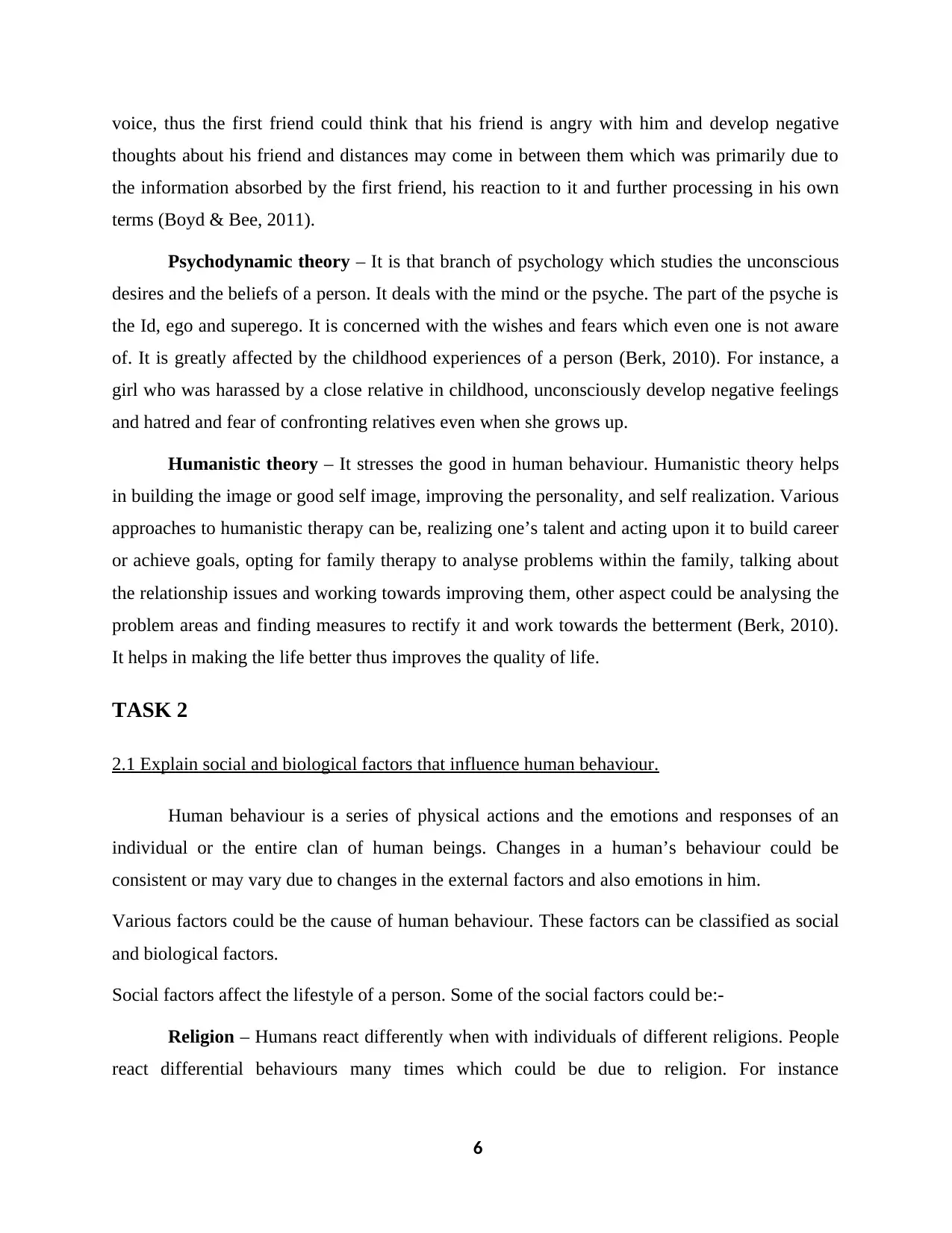
voice, thus the first friend could think that his friend is angry with him and develop negative
thoughts about his friend and distances may come in between them which was primarily due to
the information absorbed by the first friend, his reaction to it and further processing in his own
terms (Boyd & Bee, 2011).
Psychodynamic theory – It is that branch of psychology which studies the unconscious
desires and the beliefs of a person. It deals with the mind or the psyche. The part of the psyche is
the Id, ego and superego. It is concerned with the wishes and fears which even one is not aware
of. It is greatly affected by the childhood experiences of a person (Berk, 2010). For instance, a
girl who was harassed by a close relative in childhood, unconsciously develop negative feelings
and hatred and fear of confronting relatives even when she grows up.
Humanistic theory – It stresses the good in human behaviour. Humanistic theory helps
in building the image or good self image, improving the personality, and self realization. Various
approaches to humanistic therapy can be, realizing one’s talent and acting upon it to build career
or achieve goals, opting for family therapy to analyse problems within the family, talking about
the relationship issues and working towards improving them, other aspect could be analysing the
problem areas and finding measures to rectify it and work towards the betterment (Berk, 2010).
It helps in making the life better thus improves the quality of life.
TASK 2
2.1 Explain social and biological factors that influence human behaviour.
Human behaviour is a series of physical actions and the emotions and responses of an
individual or the entire clan of human beings. Changes in a human’s behaviour could be
consistent or may vary due to changes in the external factors and also emotions in him.
Various factors could be the cause of human behaviour. These factors can be classified as social
and biological factors.
Social factors affect the lifestyle of a person. Some of the social factors could be:-
Religion – Humans react differently when with individuals of different religions. People
react differential behaviours many times which could be due to religion. For instance
6
thoughts about his friend and distances may come in between them which was primarily due to
the information absorbed by the first friend, his reaction to it and further processing in his own
terms (Boyd & Bee, 2011).
Psychodynamic theory – It is that branch of psychology which studies the unconscious
desires and the beliefs of a person. It deals with the mind or the psyche. The part of the psyche is
the Id, ego and superego. It is concerned with the wishes and fears which even one is not aware
of. It is greatly affected by the childhood experiences of a person (Berk, 2010). For instance, a
girl who was harassed by a close relative in childhood, unconsciously develop negative feelings
and hatred and fear of confronting relatives even when she grows up.
Humanistic theory – It stresses the good in human behaviour. Humanistic theory helps
in building the image or good self image, improving the personality, and self realization. Various
approaches to humanistic therapy can be, realizing one’s talent and acting upon it to build career
or achieve goals, opting for family therapy to analyse problems within the family, talking about
the relationship issues and working towards improving them, other aspect could be analysing the
problem areas and finding measures to rectify it and work towards the betterment (Berk, 2010).
It helps in making the life better thus improves the quality of life.
TASK 2
2.1 Explain social and biological factors that influence human behaviour.
Human behaviour is a series of physical actions and the emotions and responses of an
individual or the entire clan of human beings. Changes in a human’s behaviour could be
consistent or may vary due to changes in the external factors and also emotions in him.
Various factors could be the cause of human behaviour. These factors can be classified as social
and biological factors.
Social factors affect the lifestyle of a person. Some of the social factors could be:-
Religion – Humans react differently when with individuals of different religions. People
react differential behaviours many times which could be due to religion. For instance
6
⊘ This is a preview!⊘
Do you want full access?
Subscribe today to unlock all pages.

Trusted by 1+ million students worldwide
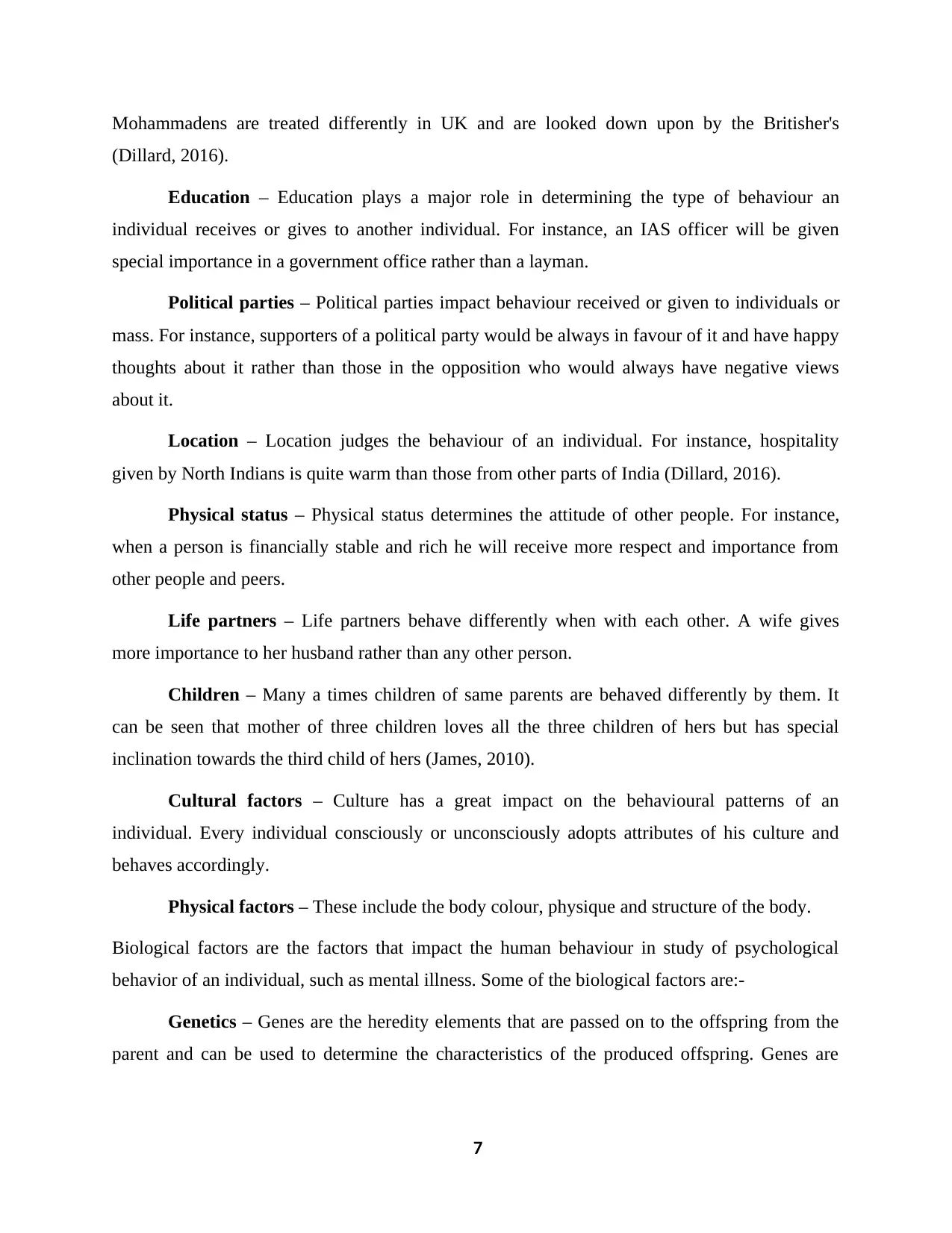
Mohammadens are treated differently in UK and are looked down upon by the Britisher's
(Dillard, 2016).
Education – Education plays a major role in determining the type of behaviour an
individual receives or gives to another individual. For instance, an IAS officer will be given
special importance in a government office rather than a layman.
Political parties – Political parties impact behaviour received or given to individuals or
mass. For instance, supporters of a political party would be always in favour of it and have happy
thoughts about it rather than those in the opposition who would always have negative views
about it.
Location – Location judges the behaviour of an individual. For instance, hospitality
given by North Indians is quite warm than those from other parts of India (Dillard, 2016).
Physical status – Physical status determines the attitude of other people. For instance,
when a person is financially stable and rich he will receive more respect and importance from
other people and peers.
Life partners – Life partners behave differently when with each other. A wife gives
more importance to her husband rather than any other person.
Children – Many a times children of same parents are behaved differently by them. It
can be seen that mother of three children loves all the three children of hers but has special
inclination towards the third child of hers (James, 2010).
Cultural factors – Culture has a great impact on the behavioural patterns of an
individual. Every individual consciously or unconsciously adopts attributes of his culture and
behaves accordingly.
Physical factors – These include the body colour, physique and structure of the body.
Biological factors are the factors that impact the human behaviour in study of psychological
behavior of an individual, such as mental illness. Some of the biological factors are:-
Genetics – Genes are the heredity elements that are passed on to the offspring from the
parent and can be used to determine the characteristics of the produced offspring. Genes are
7
(Dillard, 2016).
Education – Education plays a major role in determining the type of behaviour an
individual receives or gives to another individual. For instance, an IAS officer will be given
special importance in a government office rather than a layman.
Political parties – Political parties impact behaviour received or given to individuals or
mass. For instance, supporters of a political party would be always in favour of it and have happy
thoughts about it rather than those in the opposition who would always have negative views
about it.
Location – Location judges the behaviour of an individual. For instance, hospitality
given by North Indians is quite warm than those from other parts of India (Dillard, 2016).
Physical status – Physical status determines the attitude of other people. For instance,
when a person is financially stable and rich he will receive more respect and importance from
other people and peers.
Life partners – Life partners behave differently when with each other. A wife gives
more importance to her husband rather than any other person.
Children – Many a times children of same parents are behaved differently by them. It
can be seen that mother of three children loves all the three children of hers but has special
inclination towards the third child of hers (James, 2010).
Cultural factors – Culture has a great impact on the behavioural patterns of an
individual. Every individual consciously or unconsciously adopts attributes of his culture and
behaves accordingly.
Physical factors – These include the body colour, physique and structure of the body.
Biological factors are the factors that impact the human behaviour in study of psychological
behavior of an individual, such as mental illness. Some of the biological factors are:-
Genetics – Genes are the heredity elements that are passed on to the offspring from the
parent and can be used to determine the characteristics of the produced offspring. Genes are
7
Paraphrase This Document
Need a fresh take? Get an instant paraphrase of this document with our AI Paraphraser
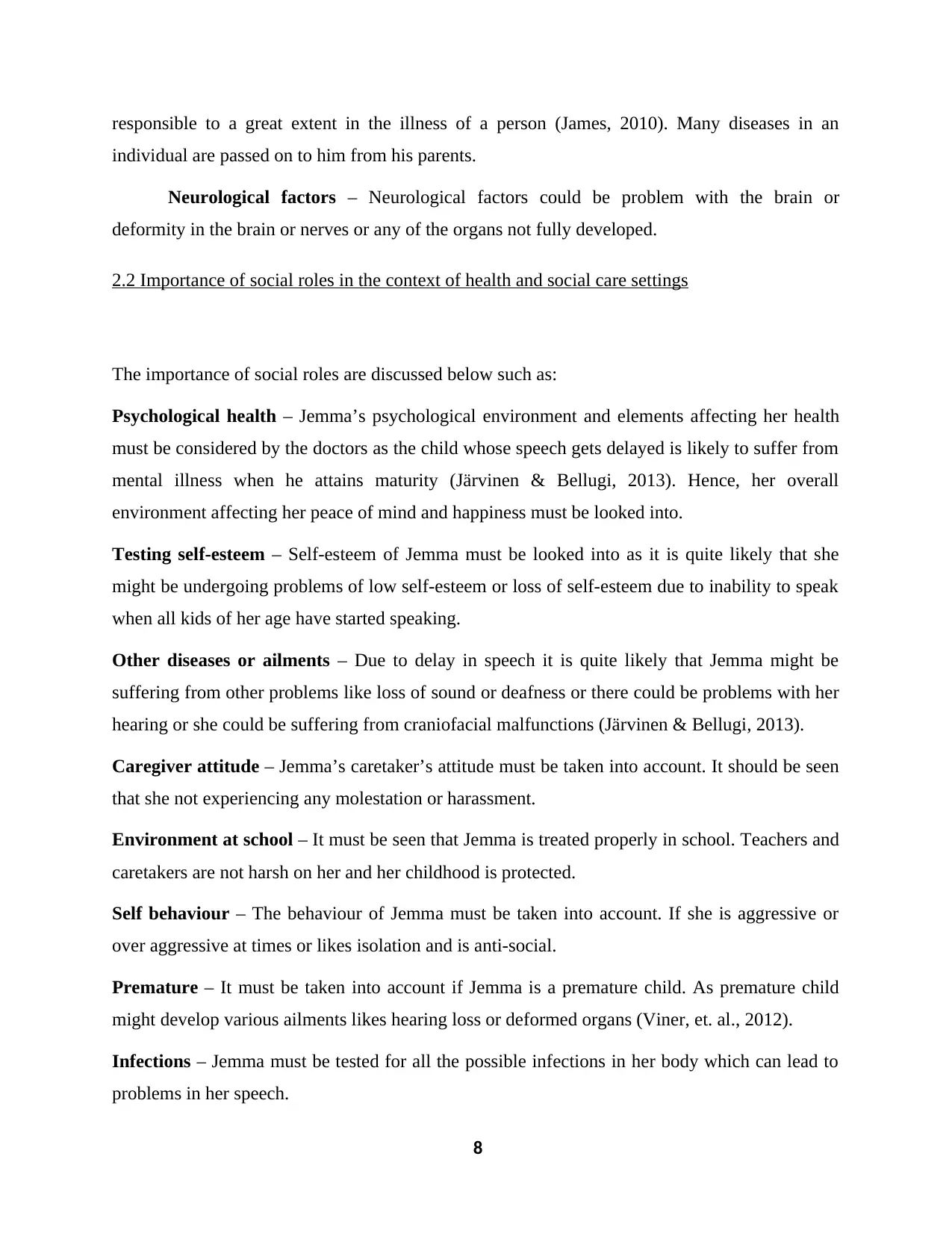
responsible to a great extent in the illness of a person (James, 2010). Many diseases in an
individual are passed on to him from his parents.
Neurological factors – Neurological factors could be problem with the brain or
deformity in the brain or nerves or any of the organs not fully developed.
2.2 Importance of social roles in the context of health and social care settings
The importance of social roles are discussed below such as:
Psychological health – Jemma’s psychological environment and elements affecting her health
must be considered by the doctors as the child whose speech gets delayed is likely to suffer from
mental illness when he attains maturity (Järvinen & Bellugi, 2013). Hence, her overall
environment affecting her peace of mind and happiness must be looked into.
Testing self-esteem – Self-esteem of Jemma must be looked into as it is quite likely that she
might be undergoing problems of low self-esteem or loss of self-esteem due to inability to speak
when all kids of her age have started speaking.
Other diseases or ailments – Due to delay in speech it is quite likely that Jemma might be
suffering from other problems like loss of sound or deafness or there could be problems with her
hearing or she could be suffering from craniofacial malfunctions (Järvinen & Bellugi, 2013).
Caregiver attitude – Jemma’s caretaker’s attitude must be taken into account. It should be seen
that she not experiencing any molestation or harassment.
Environment at school – It must be seen that Jemma is treated properly in school. Teachers and
caretakers are not harsh on her and her childhood is protected.
Self behaviour – The behaviour of Jemma must be taken into account. If she is aggressive or
over aggressive at times or likes isolation and is anti-social.
Premature – It must be taken into account if Jemma is a premature child. As premature child
might develop various ailments likes hearing loss or deformed organs (Viner, et. al., 2012).
Infections – Jemma must be tested for all the possible infections in her body which can lead to
problems in her speech.
8
individual are passed on to him from his parents.
Neurological factors – Neurological factors could be problem with the brain or
deformity in the brain or nerves or any of the organs not fully developed.
2.2 Importance of social roles in the context of health and social care settings
The importance of social roles are discussed below such as:
Psychological health – Jemma’s psychological environment and elements affecting her health
must be considered by the doctors as the child whose speech gets delayed is likely to suffer from
mental illness when he attains maturity (Järvinen & Bellugi, 2013). Hence, her overall
environment affecting her peace of mind and happiness must be looked into.
Testing self-esteem – Self-esteem of Jemma must be looked into as it is quite likely that she
might be undergoing problems of low self-esteem or loss of self-esteem due to inability to speak
when all kids of her age have started speaking.
Other diseases or ailments – Due to delay in speech it is quite likely that Jemma might be
suffering from other problems like loss of sound or deafness or there could be problems with her
hearing or she could be suffering from craniofacial malfunctions (Järvinen & Bellugi, 2013).
Caregiver attitude – Jemma’s caretaker’s attitude must be taken into account. It should be seen
that she not experiencing any molestation or harassment.
Environment at school – It must be seen that Jemma is treated properly in school. Teachers and
caretakers are not harsh on her and her childhood is protected.
Self behaviour – The behaviour of Jemma must be taken into account. If she is aggressive or
over aggressive at times or likes isolation and is anti-social.
Premature – It must be taken into account if Jemma is a premature child. As premature child
might develop various ailments likes hearing loss or deformed organs (Viner, et. al., 2012).
Infections – Jemma must be tested for all the possible infections in her body which can lead to
problems in her speech.
8
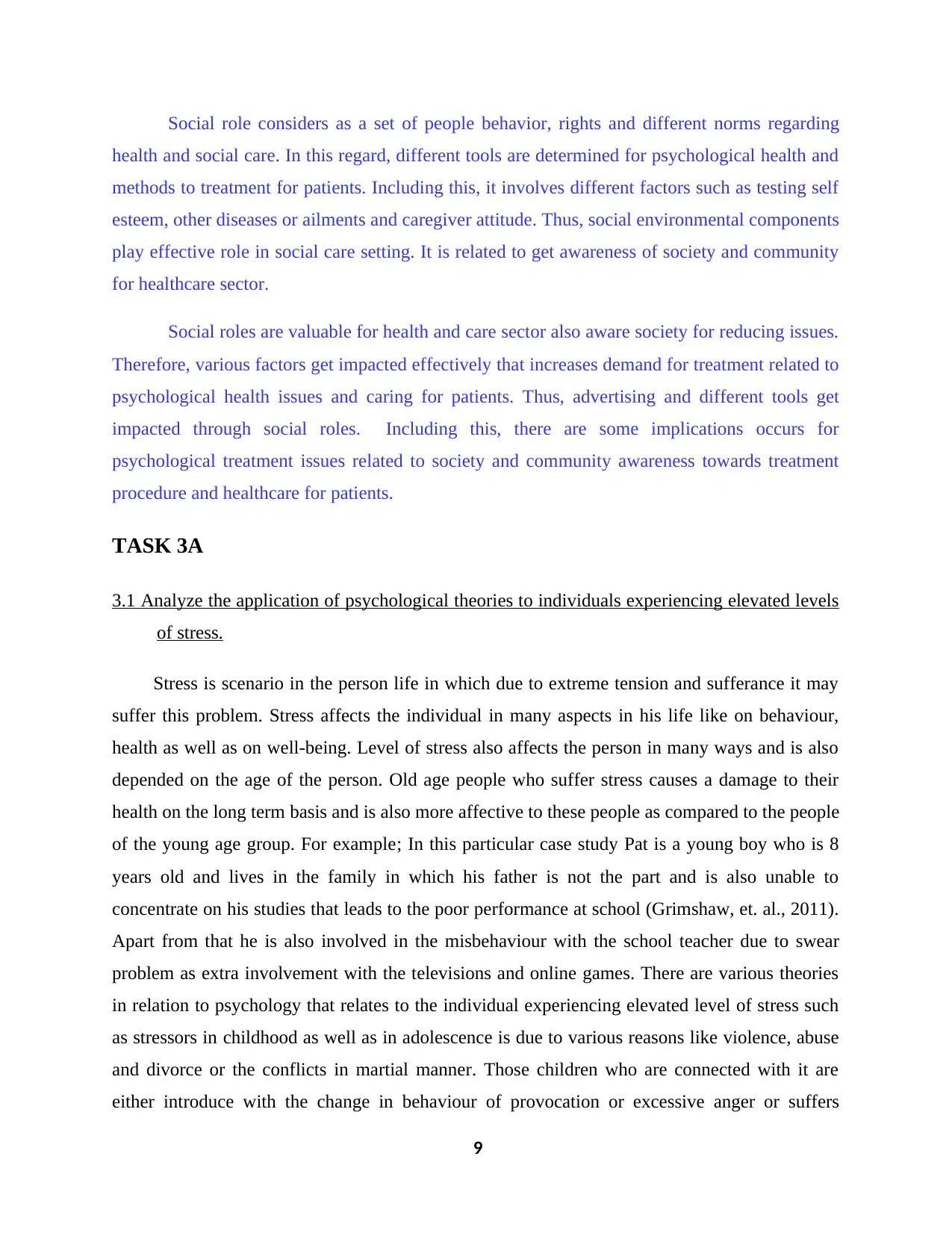
Social role considers as a set of people behavior, rights and different norms regarding
health and social care. In this regard, different tools are determined for psychological health and
methods to treatment for patients. Including this, it involves different factors such as testing self
esteem, other diseases or ailments and caregiver attitude. Thus, social environmental components
play effective role in social care setting. It is related to get awareness of society and community
for healthcare sector.
Social roles are valuable for health and care sector also aware society for reducing issues.
Therefore, various factors get impacted effectively that increases demand for treatment related to
psychological health issues and caring for patients. Thus, advertising and different tools get
impacted through social roles. Including this, there are some implications occurs for
psychological treatment issues related to society and community awareness towards treatment
procedure and healthcare for patients.
TASK 3A
3.1 Analyze the application of psychological theories to individuals experiencing elevated levels
of stress.
Stress is scenario in the person life in which due to extreme tension and sufferance it may
suffer this problem. Stress affects the individual in many aspects in his life like on behaviour,
health as well as on well-being. Level of stress also affects the person in many ways and is also
depended on the age of the person. Old age people who suffer stress causes a damage to their
health on the long term basis and is also more affective to these people as compared to the people
of the young age group. For example; In this particular case study Pat is a young boy who is 8
years old and lives in the family in which his father is not the part and is also unable to
concentrate on his studies that leads to the poor performance at school (Grimshaw, et. al., 2011).
Apart from that he is also involved in the misbehaviour with the school teacher due to swear
problem as extra involvement with the televisions and online games. There are various theories
in relation to psychology that relates to the individual experiencing elevated level of stress such
as stressors in childhood as well as in adolescence is due to various reasons like violence, abuse
and divorce or the conflicts in martial manner. Those children who are connected with it are
either introduce with the change in behaviour of provocation or excessive anger or suffers
9
health and social care. In this regard, different tools are determined for psychological health and
methods to treatment for patients. Including this, it involves different factors such as testing self
esteem, other diseases or ailments and caregiver attitude. Thus, social environmental components
play effective role in social care setting. It is related to get awareness of society and community
for healthcare sector.
Social roles are valuable for health and care sector also aware society for reducing issues.
Therefore, various factors get impacted effectively that increases demand for treatment related to
psychological health issues and caring for patients. Thus, advertising and different tools get
impacted through social roles. Including this, there are some implications occurs for
psychological treatment issues related to society and community awareness towards treatment
procedure and healthcare for patients.
TASK 3A
3.1 Analyze the application of psychological theories to individuals experiencing elevated levels
of stress.
Stress is scenario in the person life in which due to extreme tension and sufferance it may
suffer this problem. Stress affects the individual in many aspects in his life like on behaviour,
health as well as on well-being. Level of stress also affects the person in many ways and is also
depended on the age of the person. Old age people who suffer stress causes a damage to their
health on the long term basis and is also more affective to these people as compared to the people
of the young age group. For example; In this particular case study Pat is a young boy who is 8
years old and lives in the family in which his father is not the part and is also unable to
concentrate on his studies that leads to the poor performance at school (Grimshaw, et. al., 2011).
Apart from that he is also involved in the misbehaviour with the school teacher due to swear
problem as extra involvement with the televisions and online games. There are various theories
in relation to psychology that relates to the individual experiencing elevated level of stress such
as stressors in childhood as well as in adolescence is due to various reasons like violence, abuse
and divorce or the conflicts in martial manner. Those children who are connected with it are
either introduce with the change in behaviour of provocation or excessive anger or suffers
9
⊘ This is a preview!⊘
Do you want full access?
Subscribe today to unlock all pages.

Trusted by 1+ million students worldwide
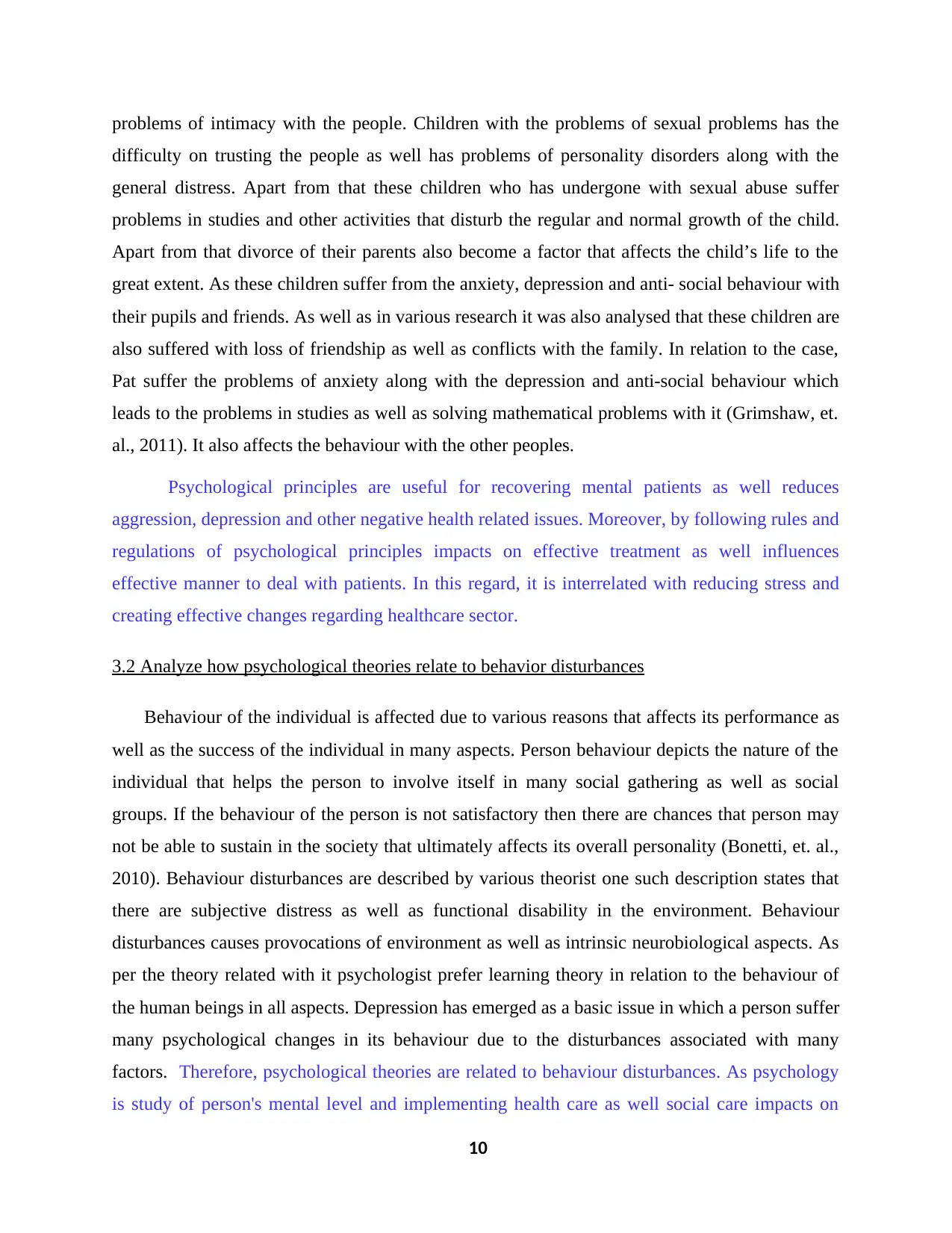
problems of intimacy with the people. Children with the problems of sexual problems has the
difficulty on trusting the people as well has problems of personality disorders along with the
general distress. Apart from that these children who has undergone with sexual abuse suffer
problems in studies and other activities that disturb the regular and normal growth of the child.
Apart from that divorce of their parents also become a factor that affects the child’s life to the
great extent. As these children suffer from the anxiety, depression and anti- social behaviour with
their pupils and friends. As well as in various research it was also analysed that these children are
also suffered with loss of friendship as well as conflicts with the family. In relation to the case,
Pat suffer the problems of anxiety along with the depression and anti-social behaviour which
leads to the problems in studies as well as solving mathematical problems with it (Grimshaw, et.
al., 2011). It also affects the behaviour with the other peoples.
Psychological principles are useful for recovering mental patients as well reduces
aggression, depression and other negative health related issues. Moreover, by following rules and
regulations of psychological principles impacts on effective treatment as well influences
effective manner to deal with patients. In this regard, it is interrelated with reducing stress and
creating effective changes regarding healthcare sector.
3.2 Analyze how psychological theories relate to behavior disturbances
Behaviour of the individual is affected due to various reasons that affects its performance as
well as the success of the individual in many aspects. Person behaviour depicts the nature of the
individual that helps the person to involve itself in many social gathering as well as social
groups. If the behaviour of the person is not satisfactory then there are chances that person may
not be able to sustain in the society that ultimately affects its overall personality (Bonetti, et. al.,
2010). Behaviour disturbances are described by various theorist one such description states that
there are subjective distress as well as functional disability in the environment. Behaviour
disturbances causes provocations of environment as well as intrinsic neurobiological aspects. As
per the theory related with it psychologist prefer learning theory in relation to the behaviour of
the human beings in all aspects. Depression has emerged as a basic issue in which a person suffer
many psychological changes in its behaviour due to the disturbances associated with many
factors. Therefore, psychological theories are related to behaviour disturbances. As psychology
is study of person's mental level and implementing health care as well social care impacts on
10
difficulty on trusting the people as well has problems of personality disorders along with the
general distress. Apart from that these children who has undergone with sexual abuse suffer
problems in studies and other activities that disturb the regular and normal growth of the child.
Apart from that divorce of their parents also become a factor that affects the child’s life to the
great extent. As these children suffer from the anxiety, depression and anti- social behaviour with
their pupils and friends. As well as in various research it was also analysed that these children are
also suffered with loss of friendship as well as conflicts with the family. In relation to the case,
Pat suffer the problems of anxiety along with the depression and anti-social behaviour which
leads to the problems in studies as well as solving mathematical problems with it (Grimshaw, et.
al., 2011). It also affects the behaviour with the other peoples.
Psychological principles are useful for recovering mental patients as well reduces
aggression, depression and other negative health related issues. Moreover, by following rules and
regulations of psychological principles impacts on effective treatment as well influences
effective manner to deal with patients. In this regard, it is interrelated with reducing stress and
creating effective changes regarding healthcare sector.
3.2 Analyze how psychological theories relate to behavior disturbances
Behaviour of the individual is affected due to various reasons that affects its performance as
well as the success of the individual in many aspects. Person behaviour depicts the nature of the
individual that helps the person to involve itself in many social gathering as well as social
groups. If the behaviour of the person is not satisfactory then there are chances that person may
not be able to sustain in the society that ultimately affects its overall personality (Bonetti, et. al.,
2010). Behaviour disturbances are described by various theorist one such description states that
there are subjective distress as well as functional disability in the environment. Behaviour
disturbances causes provocations of environment as well as intrinsic neurobiological aspects. As
per the theory related with it psychologist prefer learning theory in relation to the behaviour of
the human beings in all aspects. Depression has emerged as a basic issue in which a person suffer
many psychological changes in its behaviour due to the disturbances associated with many
factors. Therefore, psychological theories are related to behaviour disturbances. As psychology
is study of person's mental level and implementing health care as well social care impacts on
10
Paraphrase This Document
Need a fresh take? Get an instant paraphrase of this document with our AI Paraphraser
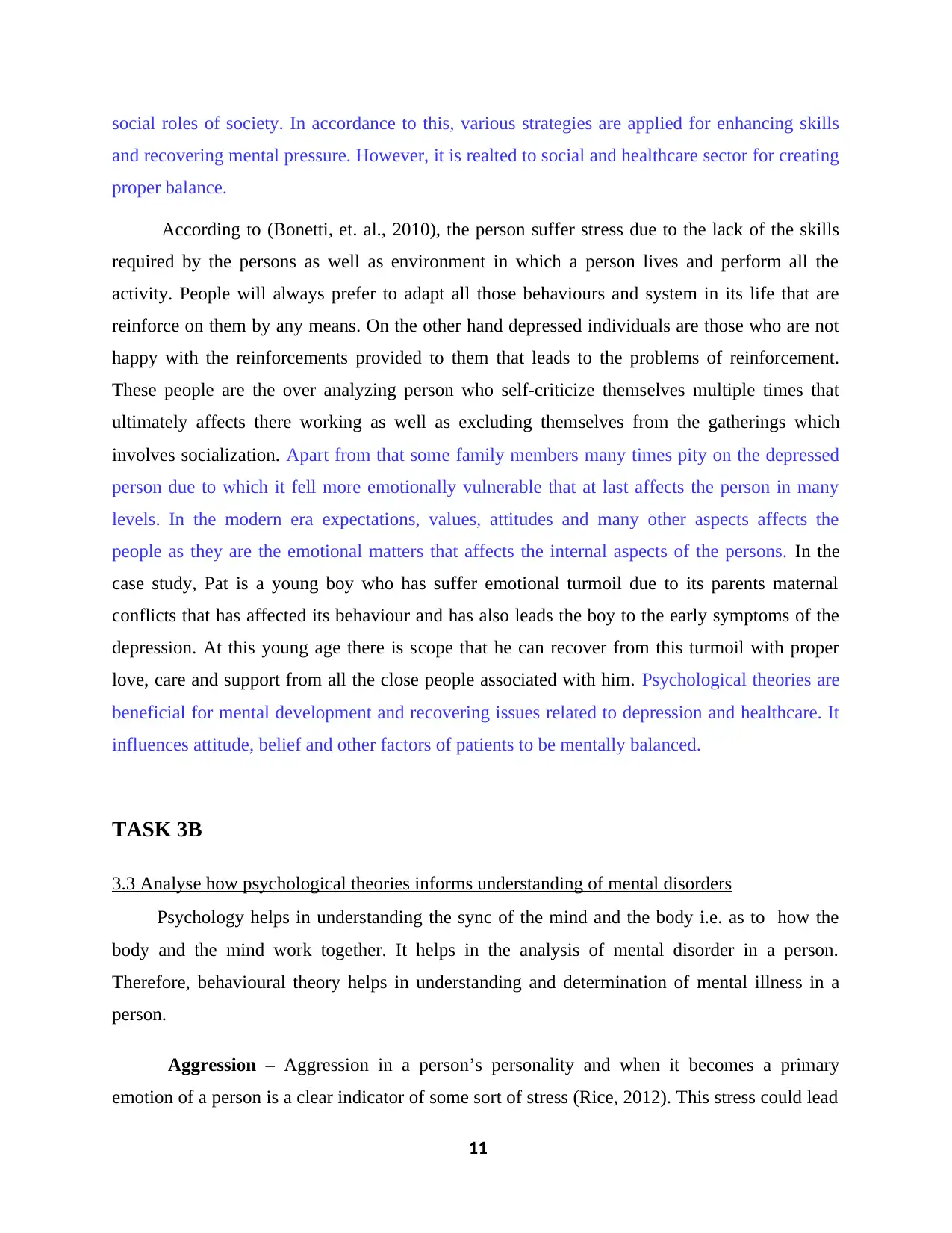
social roles of society. In accordance to this, various strategies are applied for enhancing skills
and recovering mental pressure. However, it is realted to social and healthcare sector for creating
proper balance.
According to (Bonetti, et. al., 2010), the person suffer stress due to the lack of the skills
required by the persons as well as environment in which a person lives and perform all the
activity. People will always prefer to adapt all those behaviours and system in its life that are
reinforce on them by any means. On the other hand depressed individuals are those who are not
happy with the reinforcements provided to them that leads to the problems of reinforcement.
These people are the over analyzing person who self-criticize themselves multiple times that
ultimately affects there working as well as excluding themselves from the gatherings which
involves socialization. Apart from that some family members many times pity on the depressed
person due to which it fell more emotionally vulnerable that at last affects the person in many
levels. In the modern era expectations, values, attitudes and many other aspects affects the
people as they are the emotional matters that affects the internal aspects of the persons. In the
case study, Pat is a young boy who has suffer emotional turmoil due to its parents maternal
conflicts that has affected its behaviour and has also leads the boy to the early symptoms of the
depression. At this young age there is scope that he can recover from this turmoil with proper
love, care and support from all the close people associated with him. Psychological theories are
beneficial for mental development and recovering issues related to depression and healthcare. It
influences attitude, belief and other factors of patients to be mentally balanced.
TASK 3B
3.3 Analyse how psychological theories informs understanding of mental disorders
Psychology helps in understanding the sync of the mind and the body i.e. as to how the
body and the mind work together. It helps in the analysis of mental disorder in a person.
Therefore, behavioural theory helps in understanding and determination of mental illness in a
person.
Aggression – Aggression in a person’s personality and when it becomes a primary
emotion of a person is a clear indicator of some sort of stress (Rice, 2012). This stress could lead
11
and recovering mental pressure. However, it is realted to social and healthcare sector for creating
proper balance.
According to (Bonetti, et. al., 2010), the person suffer stress due to the lack of the skills
required by the persons as well as environment in which a person lives and perform all the
activity. People will always prefer to adapt all those behaviours and system in its life that are
reinforce on them by any means. On the other hand depressed individuals are those who are not
happy with the reinforcements provided to them that leads to the problems of reinforcement.
These people are the over analyzing person who self-criticize themselves multiple times that
ultimately affects there working as well as excluding themselves from the gatherings which
involves socialization. Apart from that some family members many times pity on the depressed
person due to which it fell more emotionally vulnerable that at last affects the person in many
levels. In the modern era expectations, values, attitudes and many other aspects affects the
people as they are the emotional matters that affects the internal aspects of the persons. In the
case study, Pat is a young boy who has suffer emotional turmoil due to its parents maternal
conflicts that has affected its behaviour and has also leads the boy to the early symptoms of the
depression. At this young age there is scope that he can recover from this turmoil with proper
love, care and support from all the close people associated with him. Psychological theories are
beneficial for mental development and recovering issues related to depression and healthcare. It
influences attitude, belief and other factors of patients to be mentally balanced.
TASK 3B
3.3 Analyse how psychological theories informs understanding of mental disorders
Psychology helps in understanding the sync of the mind and the body i.e. as to how the
body and the mind work together. It helps in the analysis of mental disorder in a person.
Therefore, behavioural theory helps in understanding and determination of mental illness in a
person.
Aggression – Aggression in a person’s personality and when it becomes a primary
emotion of a person is a clear indicator of some sort of stress (Rice, 2012). This stress could lead
11
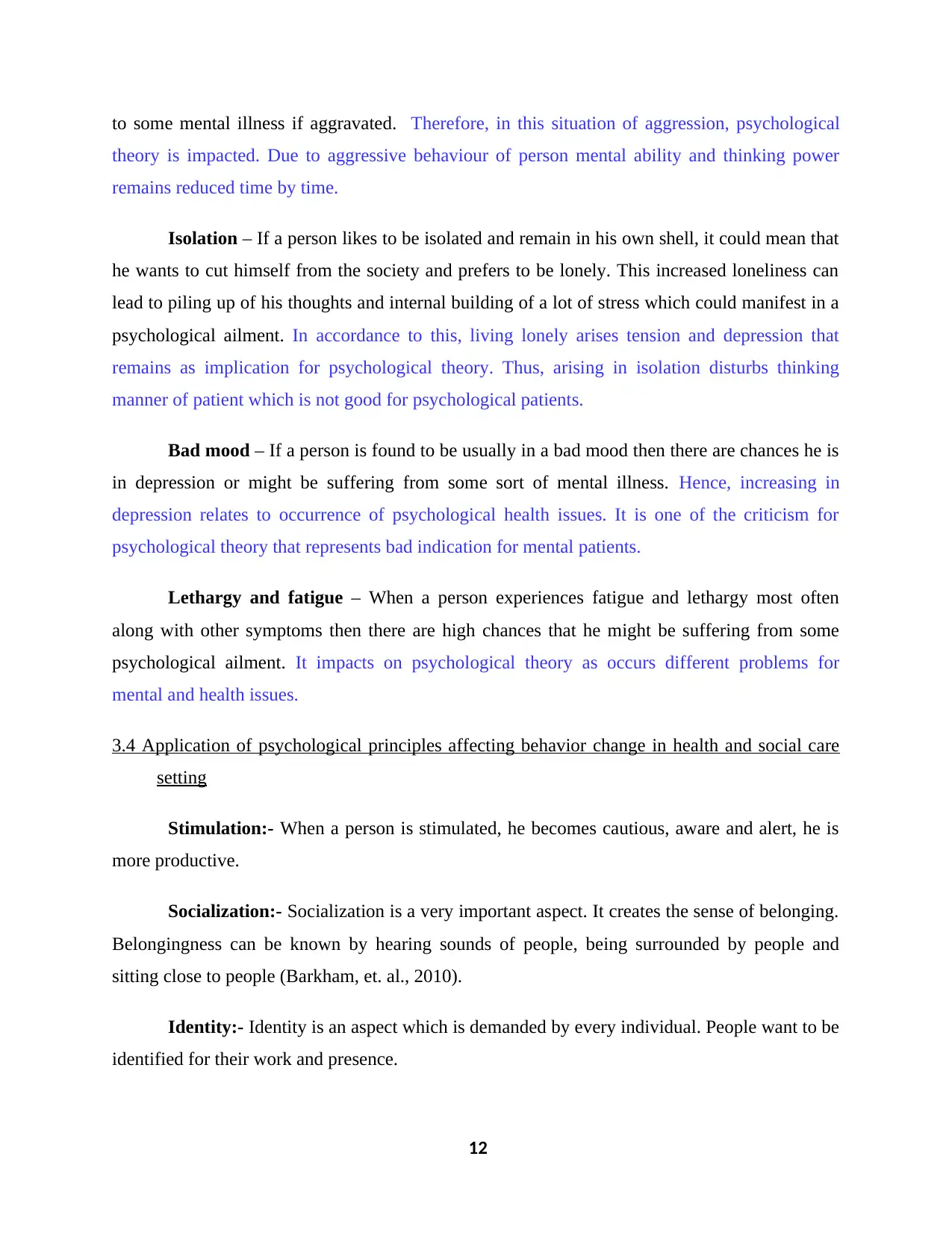
to some mental illness if aggravated. Therefore, in this situation of aggression, psychological
theory is impacted. Due to aggressive behaviour of person mental ability and thinking power
remains reduced time by time.
Isolation – If a person likes to be isolated and remain in his own shell, it could mean that
he wants to cut himself from the society and prefers to be lonely. This increased loneliness can
lead to piling up of his thoughts and internal building of a lot of stress which could manifest in a
psychological ailment. In accordance to this, living lonely arises tension and depression that
remains as implication for psychological theory. Thus, arising in isolation disturbs thinking
manner of patient which is not good for psychological patients.
Bad mood – If a person is found to be usually in a bad mood then there are chances he is
in depression or might be suffering from some sort of mental illness. Hence, increasing in
depression relates to occurrence of psychological health issues. It is one of the criticism for
psychological theory that represents bad indication for mental patients.
Lethargy and fatigue – When a person experiences fatigue and lethargy most often
along with other symptoms then there are high chances that he might be suffering from some
psychological ailment. It impacts on psychological theory as occurs different problems for
mental and health issues.
3.4 Application of psychological principles affecting behavior change in health and social care
setting
Stimulation:- When a person is stimulated, he becomes cautious, aware and alert, he is
more productive.
Socialization:- Socialization is a very important aspect. It creates the sense of belonging.
Belongingness can be known by hearing sounds of people, being surrounded by people and
sitting close to people (Barkham, et. al., 2010).
Identity:- Identity is an aspect which is demanded by every individual. People want to be
identified for their work and presence.
12
theory is impacted. Due to aggressive behaviour of person mental ability and thinking power
remains reduced time by time.
Isolation – If a person likes to be isolated and remain in his own shell, it could mean that
he wants to cut himself from the society and prefers to be lonely. This increased loneliness can
lead to piling up of his thoughts and internal building of a lot of stress which could manifest in a
psychological ailment. In accordance to this, living lonely arises tension and depression that
remains as implication for psychological theory. Thus, arising in isolation disturbs thinking
manner of patient which is not good for psychological patients.
Bad mood – If a person is found to be usually in a bad mood then there are chances he is
in depression or might be suffering from some sort of mental illness. Hence, increasing in
depression relates to occurrence of psychological health issues. It is one of the criticism for
psychological theory that represents bad indication for mental patients.
Lethargy and fatigue – When a person experiences fatigue and lethargy most often
along with other symptoms then there are high chances that he might be suffering from some
psychological ailment. It impacts on psychological theory as occurs different problems for
mental and health issues.
3.4 Application of psychological principles affecting behavior change in health and social care
setting
Stimulation:- When a person is stimulated, he becomes cautious, aware and alert, he is
more productive.
Socialization:- Socialization is a very important aspect. It creates the sense of belonging.
Belongingness can be known by hearing sounds of people, being surrounded by people and
sitting close to people (Barkham, et. al., 2010).
Identity:- Identity is an aspect which is demanded by every individual. People want to be
identified for their work and presence.
12
⊘ This is a preview!⊘
Do you want full access?
Subscribe today to unlock all pages.

Trusted by 1+ million students worldwide
1 out of 17
Related Documents
Your All-in-One AI-Powered Toolkit for Academic Success.
+13062052269
info@desklib.com
Available 24*7 on WhatsApp / Email
![[object Object]](/_next/static/media/star-bottom.7253800d.svg)
Unlock your academic potential
Copyright © 2020–2026 A2Z Services. All Rights Reserved. Developed and managed by ZUCOL.





